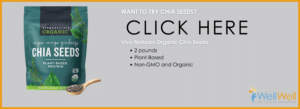The Skinny:
Talk about small but powerful. That is the perfect description of chia seeds. Chia seeds’ benefits are widely praised, as they are said to possess antioxidant and anti-inflammatory powers, provide liver protection, support brain function and fight diabetes. If that’s not enough, they are great for heart health and blood pressure. Oh yeah, they are also known to help generate great companions, otherwise known as chia pets.
The Slate:
Planting A Description
These small buggers are a pseudo-grain, a carbohydrate-rich seed, effectively a non-grass plant in the mint family. Their mottled, oval seeds are hygroscopic, meaning when they encounter liquid, they expand and grow a thick gel coating. They have been around since 3500 B.C. In Mayan, chia means strength, Not surprisingly then Aztecs and Mayans used this dietary and medicinal staple to fuel their long-distance running couriers.
Munchability
Chia seeds can be eaten raw but are even healthier when hydrated. They can be sprinkled on yogurt, cereal or salads, whirled into smoothies, added to “overnight oatmeal” and used as egg or breadcrumb substates in baking. They’re great additions to homemade granola bars.
Superfood-Level Nutrition
Chia seeds’ myriad benefits are attributed to amino acids, unsaturated fatty acids, polyphenols, vitamins, mineral salts and dietary fiber. A two-tablespoon serving (one ounce or 28 grams) contains 138 calories, 4.7 grams of protein, 8.7 grams of fat, 5 grams of alpha-linolenic acid, 11.9 grams of carbohydrate, 9.8 grams fiber, 14 percent of calcium Daily Value (DV), 12 percent of the iron DV, 23 percent of the magnesium DV, 20 percent of the phosphorus DV, 12 percent of the zinc DV, 15 percent of the vitamin B1 (thiamine) DV and 16 percent of the vitamin B3 (niacin) DV.
Antioxidant and Anti-Inflammatory Power
Chia seeds contain chlorogenic acid, caffeic acid, myricetin, quercetin and kaempferol, antioxidants that help keep their fats from becoming rancid and neutralize the free radicals that contribute to aging and disease in our body cells and help lower blood cholesterol. They also have anti-inflammatory properties that impact many bodily systems and functions.
Blood Cholesterol Assist
Chia seeds’ omega-3 fatty acids improve blood cholesterol balance by boosting good high-density lipoprotein (HDL) levels. One study indicated that 30 days of breakfasts of oatmeal containing two tablespoons of chia seeds increased average HDL levels by 5.75 mg/dL, better than the 2.00 mg/dL increase for oatmeal alone and the 1.00 mg/dL decrease for a Cheerios control group.
Relieves High Blood Pressure
Consuming 40 grams of chia seeds daily for 12 weeks reportedly can significantly reduce systolic blood pressure in hypertensive patients with Type 2 diabetes. A range of studies found no significant effect on diastolic pressure.
Liver Disease Support
No drug is specifically approved for nonalcoholic fatty liver disease (NAFD). However, antioxidant, anti-inflammatory and lipid-lowering dietary supplements are often used. One research project suggests that over half of the patients with NAFD who consumed 25 grams of milled chia seeds daily for eight weeks had a significant regression in their disease. All of these patients lost visceral abdominal fat, total cholesterol, non-high-density lipoprotein cholesterol and circulating free fatty acids.
Brain Power
Many of chia’s general health benefits are focused on supporting brain health. Its antioxidants are especially helpful in fighting Parkinson’s and Alzheimer’s diseases by scavenging free radicals that cause oxidative damage. One study also noted that chia’s omega-3 fatty acid-based molecules can help stressed-out folks relax.
Diabetes, Insulin and Blood Sugar Benefits
Early reports that chia seeds slowed digestion and lowered blood sugar were good news/bad news for diabetics. Modest effects could help, larger effects might interfere with insulin medication. More well-designed research is needed to draw more specific conclusions.
Impact on Cancer
There’s considerable evidence to support chia seeds’ ability to slow breast and cervical cancer tumor growth in humans and animals. However, some worry that chia seeds’ high levels of alpha-linolenic acid (ALA) could increase the risk of developing prostate cancer. Additional work is needed in this area.
Cautions
Overconsumption could cause constipation, diarrhea, bloating, and/or gas or provoke flare-ups of inflammatory bowel conditions like Crohn’s disease. Research is inconclusive on interactions of large doses of chia with medications for diabetes, high blood pressure and some cardiovascular conditions (e.g., antiplatelet and anticoagulant drugs).
Eyes Up:
Are you a chia champion? Tell us why at info@wellwellusa.com.
WellWell editors independently identify services and products of interest. If readers purchase anything through the associated links, WellWell may earn a commission, which goes to support our work. Learn More.













